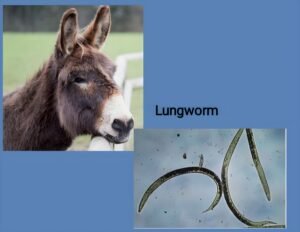Lungworm

Lo
LUNGWORM
The lungworm, known as Dictyocaulus arnfieldi, is a parasite that primarily targets the lungs of donkeys and other equine species. Donkeys serve as the main host for this parasite, and it is uncommon for horses to develop adult forms that produce eggs following an infection.
However, lungworm can lead to clinical symptoms in both donkeys and horses, especially in situations where horses share grazing areas with donkeys or mules, although the overall risk remains relatively low.
While mules can also be infected with lungworm, such occurrences are rare.
HOW DO EQUINES CONTRACT INFECTIONS?
Donkeys, horses, and ponies can coexist safely, provided we remain vigilant about the risk of lungworm and implement a parasite control strategy in consultation with your veterinarian or SQP. When larvae are ingested by a horse or donkey, they penetrate the intestinal wall and travel through the bloodstream to the lungs, where they mature into adults.
The lungworm takes approximately 5-6 weeks to reach full maturity, growing up to 8 cm in length, and resides in the bronchi and bronchioles of the lungs.
Lungworm is more commonly found in damp grazing areas. The larvae can survive in the soil for an extended period, so effective pasture management practices, such as regular manure removal and cross-grazing with other species, can help minimize infection without relying solely on chemical treatments.
SYMPTOMS
The presence of lungworms in the lungs can cause significant harm, particularly in weakened animals when there is a high infestation. Infection leads to irritation of the mucosal lining, resulting in parasitic bronchitis, increased mucus production, and subsequent breathing difficulties, severe coughing, and loss of appetite.
Severe bronchitis may be accompanied by chronic pneumonia, pulmonary edema, and secondary bacterial infections.
Heavy infestations can obstruct small airways, potentially leading to fatal outcomes, especially in foals. Donkeys appear to tolerate substantial lungworm infestations without displaying significant clinical signs, aside from occasionally harsh lung sounds or lack of weight gain, while horses infected with the parasite typically show clear symptoms such as coughing and rapid breathing.
SEDIMENTATION TEST FOR LUNGWORM
When a lungworm infection is suspected, a faecal sedimentation test can be performed in the laboratory to confirm the diagnosis.
This method effectively isolates the heavier larvae of the lungworm from the faecal material, allowing for microscopic identification.
Since the parasite seldom reaches the egg-laying stage in horses, it is often more effective to test donkeys or mules, which are believed to be the primary hosts of the infection, rather than the symptomatic horse.
Testing can be conducted throughout the year, and treatment is advised if any signs of lungworm infection are detected in the sample.
The sedimentation test requires 2-3 times more faecal material than a standard worm egg count and takes several days to complete.
TREATMENT FOR LUNGWORM
Ivermectin and moxidectin are the most effective treatments available for lungworm. Both medications can be administered to horses, but not all ivermectin-based dewormers or moxidectin are approved for use in donkeys.
If there is any uncertainty, it is advisable to consult with a veterinarian or a Suitably Qualified Person (SQP). The Donkey Sanctuary recommends the Eqvalan brand over generic ivermectin dewormers due to the positive treatment outcomes observed in their animals.
GENERAL GUIDANCE ON WORMING DONKEYS
The British Equine Veterinary Association supports a targeted worm control strategy for donkeys, which is based on worm counts and testing. Treatment should only be administered when tests indicate a need, particularly for specific seasonal issues such as encysted redworm, lungworm, bots, and pinworm.
This approach helps mitigate the development of drug resistance and is more beneficial for both the donkey and the environment. Worm counts should be conducted every three months to monitor for redworm and roundworm, while an EquiSal saliva test should be performed every six months to check for tapeworm.
Although the EquiSal test has not been scientifically validated for donkeys at the post-mortem level, many donkeys have been tested with positive results. Foals, youngstock, and those with a poor start will require additional attention.
A winter treatment for encysted redworm should be administered between December and February, consisting of a five-day course of fenbendazole, accompanied by a resistance test to assess its effectiveness (note that moxidectin is not approved for use in donkeys).
If tapeworm treatment is necessary, a double dose of pyrantel is recommended, as praziquantel is not authorized for use in donkeys. Mules should be treated following the same guidelines as those for donkeys.
